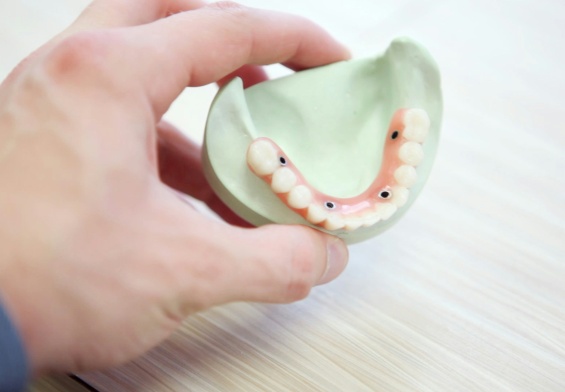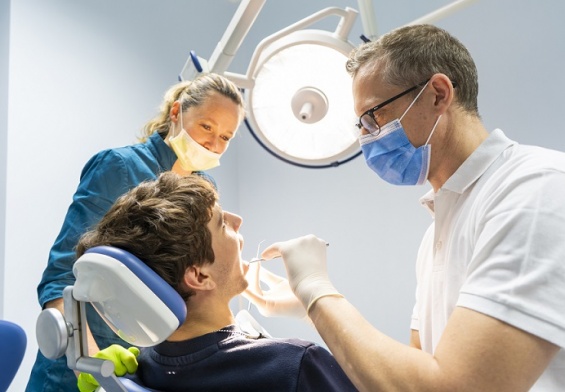As seniors age, maintaining proper dental care becomes more challenging, especially for those who are homebound due to chronic illnesses or mobility issues. However, oral health is crucial for overall well-being, and for seniors, it’s essential to address dental care alongside other senior care services. Whether it’s managing dry mouth in seniors, treating gum disease, or ensuring regular dental checkups, the integration of home dental care for seniors into broader care plans can significantly enhance quality of life.
The Importance of Senior Dental Care at Home
Good oral hygiene is critical for preventing common dental problems in seniors, such as tooth loss, dry mouth, and gum disease. However, for many elderly individuals who receive in-home care for chronic illnesses, accessing dental care services can be difficult. This is where mobile dentistry services and home dental care for homebound seniors come into play, ensuring that oral health is maintained even when seniors cannot visit a traditional dentist’s office.
Home oral hygiene routines for the elderly should focus on preventing the buildup of plaque and tartar, managing dry mouth, and addressing the specific oral health needs that come with aging. Regular cleanings, brushing, and flossing are crucial, but they must be adapted to the capabilities of seniors, particularly those with disabilities or limited mobility.
Common Dental Issues Faced by Seniors
Aging brings specific oral health challenges. Tooth loss in seniors and gum disease are common, often exacerbated by medications that cause dry mouth. Without proper attention, these issues can lead to discomfort, difficulty eating, and even systemic health problems. Seniors with chronic conditions such as diabetes are particularly susceptible to dental problems, making home care for individuals with disabilities or chronic illnesses even more vital.
Caregivers play a critical role in senior oral health care, ensuring that daily routines are followed. For homebound seniors, caregiver assistance with oral hygiene is essential. It can include helping with brushing, scheduling mobile dentist visits, and ensuring that seniors follow through with dental checkups. Interdisciplinary collaboration for senior dental care is also crucial, involving healthcare providers, caregivers, and dental professionals in the development of a personalized care plan.
Benefits of House Call Dentistry for Seniors
One of the significant advancements in geriatric dentistry is the availability of mobile dental services for seniors. For homebound seniors, this service allows access to necessary care without the difficulty of traveling to a clinic. The benefits of house call dentistry for seniors include convenience, personalized care, and regular monitoring of oral health in conjunction with overall health.
Mobile dentistry services bring a full range of dental care to the comfort of the home, including routine cleanings, denture fittings, and even more complex treatments. This approach aligns with the benefits of in-home care for seniors, where healthcare is brought to the patient, making it easier to manage chronic conditions and maintain quality of life.
Overcoming the Challenges of Senior Dental Care
While in-home care services for the elderly have become more common, dental care still faces several challenges. Many seniors experience difficulty maintaining regular oral health checkups due to mobility issues, financial constraints, or a lack of affordable home care options. Addressing these barriers through programs that bring dental care into the home is key to improving dental care access for elderly populations.
For seniors with dementia or Alzheimer’s, specialized care services for dementia patients must also include oral care. As cognitive decline progresses, it becomes harder for these individuals to maintain hygiene routines. Caregivers trained in personalized care plans for home care can ensure that seniors with cognitive impairments receive the necessary dental attention.
The Role of Caregivers in Senior Dental Health
For many seniors, maintaining independence is a priority, but it often requires assistance with daily activities like oral hygiene. In-home caregivers near you can help seniors with everything from brushing and flossing to scheduling visits from mobile dentists for homebound seniors. Additionally, they can support seniors in managing dry mouth, an issue commonly caused by medications. Caregiver tips for senior dental care often involve adjusting hygiene routines and finding products that accommodate seniors’ needs, such as soft-bristled toothbrushes or dental rinses designed for dry mouth.
Another important aspect of senior dental care is regular monitoring of dentures. Ill-fitting dentures can lead to oral health problems such as sores, infections, and difficulty eating. In in-home senior care, caregivers can ensure that dentures are kept clean, fit properly, and are replaced when necessary.
Conclusion: Maintaining Oral Health in Senior Home Care
Oral health is an integral part of a senior’s overall well-being, and it must be a focus of home care services for the elderly. From dental care for elderly patients to overcoming challenges in senior oral health care, ensuring seniors receive proper dental attention is essential for maintaining their quality of life. Whether through house call dentistry, assistance from in-home caregivers, or a personalized care plan, senior dental care can be seamlessly integrated into at-home senior care services.
By addressing the dental problems of older adults, caregivers and dental professionals can help seniors live healthier, more comfortable lives, ensuring that oral health remains a priority even in the later stages of life.
Resources:
- Dental care for older adults in home health care services – practices, perceived knowledge and challenges among Norwegian dentists and dental hygienists – BMC Oral Health
- Dental Care for Homebound Seniors – Ultimate Care NY
- Dental Care for Seniors – WebMD




